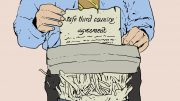Exactly a year ago, the period between Dec. 27, 2008-Jan. 18, 2009, Gaza was bombed by Israel “going wild,” to use the terms of the Israeli foreign minister Tzipi Livni.
Israel, in its so-called retaliation to continued Hamas rockets being fired, seiged Gaza and massacred a large number of Palestinians using the most primitive military weapons. For instance, air strikes and white phosphorus bombs were used repeatedly and indiscriminately on people herded together like cattle behind fences and walls.
In spite of this record of utter devastation, some Hamas members claimed it a victory. In the name of the absentee, I have a more modest approach to describe things as they are — a defeat. As the Palestinian poet Mahmoud Darwish said, “There’s more inspiration and humanity in defeat than there is in victory. If I belonged to the victor’s camp, I’d demonstrate my support for the victims.”
What happened in Gaza, in 2009, was one bigger defeat among other preceding ones. Today, a year later, as described by the Associated Press, “Gaza’s scars are still frozen in place [ . . . ] Entire neighborhoods still lie in rubble, and traumatized residents cannot rebuild their lives.” As we speak, what worsens the living circumstances of the Gazans, in line with Israeli tradition of wall building around Gaza and other towns, is how Egypt is also erecting a wall between its borders with Gaza, thus further strengthening the backbone of the colonial siege on Gaza and its existence as an open-air prison.
Regardless of the justifications chosen to deem or celebrate the Gaza Massacre, the event is part of a broader picture of colonizing the Palestinians. What occurred in Gaza might have seemed exceptional in terms of death tolls and destruction, but, as an event, it does not mark an exception in the state of affairs between the Palestinians and the Israeli government. Instead, it marks a norm between the colonizers and the colonized. Although the forms, style and sways of violence might have changed, the relationship between the Palestinians and the Israeli government, like other indigenous peoples under colonization, was and remains inherently violent. For this reason, we should commemorate not the massacre or the “war,” neither the heroes nor the enemies, but the absent Palestinian voice that suffered the most from the Israeli occupation.
Palestinians are living in a permanent state of exception. Treated as a “less than us” people, their rights are limited to the extent that allows Israel to get away with legally suspending them whenever it allegedly feels threatened. As a result, the Palestinians are increasingly becoming the exiled, the beggars, the sick and the “wretched.” Since 1967, and in spite of “peace” talks, Israel has done nothing but deepen its roots on the map and change facts on the ground to exclude more and more Palestinians.
For instance, the biggest water source for Israel is obtained from pumping water from underground reserves in the military occupied West Bank. Israel does not allow Palestinians to dig water wells and cuts off their water supplies on their own lands, while at the same time water is being pumped in unlimited amounts to Israel and settlers. Due to these restrictions, Israelis have access to water almost “four times more than Palestinians”. Some would even say that the settlers’ dogs have greater access to water than the Palestinians.
When attempting to explain the Israeli-Palestinian conflict, it is illogical and unfair to put the blame — and more importantly the responsibility to come up with a peaceful solution — equally on both parties. Israel, above all, needs to be pressured to end its occupation and acknowledge its devastating impacts on the Palestinians. Defining the Palestinians as equally responsible to Israel reduces the blame and pressure on Israel, and diffuses the responsibility of supporting the Palestinian plight.
As for who truly holds the key to ending the conflict and ensuing violence between Palestinians and Israel, it is the Israeli government. End the expanding Israeli occupation by helping to bring about an end to the colonial rule over the Palestinians. After all they have almost nothing to lose. Help free the Palestinians and give them now what all the oppressed ask for: the potential to speak in the name of the absentee.
Fadi Ennab is a Master’s student in sociology at the University of Manitoba.


